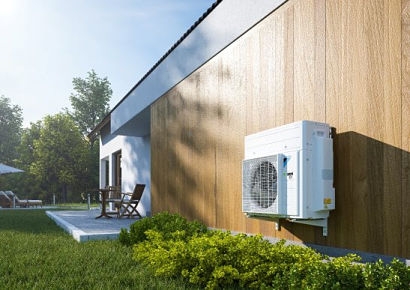
The company also believes continuous innovations in heat pump technology will help to decarbonise Europe and to combine decarbonisation with sustainable economic growth, the core principles of the Green Deal.
Europe wants to become the world’s first climate-neutral continent by 2050, and the EU Commission aims to reduce emissions by at least 55 percent by 2030. Daikin has said it supports this aim and is striving to become a climate-neutral company globally by 2050.
However, decarbonising Europe and recovering from the COVID-19 pandemic are massive challenges. When presenting the Green Deal, the European Commission’s President even called it Europe’s “man-on-the-moon moment”. In implementing the Green Deal, Daikin wants to see the EU and its Member States promoting low carbon technologies, like heat pumps.
Currently, the European building stock is responsible for approximately 36 percent of all CO2 emissions in the EU. Taking into account that almost 50 percent of European Union’s final energy consumption is used for heating and cooling, of which 80 percent is used in buildings, the potential for decarbonising this sector is massive.
Daikin says that heat pumps are a proven solution, and that Europe has the technology, the expertise and the investments to expand this segment further. From single family to multi-family homes, from renovation to new housing, from small to large commercial buildings and industrial plants, heat pumps today are ready and fit for the EU Green Deal.
Heat pumps are a low carbon heating technology, utilising renewable energy such as thermal energy from the air, the water or the ground. These renewable energy sources are abundantly available in Europe; so do not need to be imported. For each kWh of required heat, the carbon impact of a heat pump today is about half of a high efficiency gas boiler, with an even lower carbon footprint potential due to the further decarbonisation of the EU electricity production. Heat pumps will therefore increasingly use renewable electricity and are on the way to being a fully climate-neutral solution.
In addition, heat pumps are essential to enable balancing of the power grid, thus supporting the further deployment of a renewable energy production. Investing in heat pumps also boosts EU economic growth as these products are widely developed and manufactured in Europe. Daikin, for example, has a European R&D centre and five factories in Europe involved in heat pump technology.
Every euro invested in heat pump technology is a euro invested in local job creation. The heat pump industry as a whole currently employs 225,000 people in Europe. New and further investments in renewable heating will pay dividends for the European economy as well as for our environment.
Following the EU Green Deal initiative, policy makers in the EU Member States can act on two levels to achieve decarbonisation.
First, EU Member States could commit to ending the use of fossil fuels. The most polluting heating systems must be phased out. Austria no longer allows oil-based boilers to be installed in new homes as of January 2020. This is an excellent initiative. Policy makers could avoid incentives for fossil fuels. Even today, direct or indirect incentives benefit oil or gas-based boilers, due to different taxation of heat pumps compared with boilers for instance.
Secondly, renewable technologies also need a level playing field. The gap between electricity and gas prices in many Member States is too high to make a heat pump an economically attractive investment for EU citizens. Incentives can bridge that gap for a certain period, but in the long run, the cost of energy should reflect the carbon intensity more. Carbon pricing can contribute to further emissions reduction by extending the EU Emission Trading System (ETS) to all emissions of fossil fuel combustion in buildings and revising the Energy Taxation directive.
The industry innovates relentlessly to make heat pumps attractive through a mix of product features, pricing, design, and installer- and end user friendliness. The industry can put more effort in explaining the benefits of heat pumps so that end users become more aware of them.
“Governments can draw consumers’ attention to heat pumps through incentives for residential renovations, but also other means could make opting for heat pumps beneficial, such as reflecting the use of renewable energy in the building’s total energy score” said Patrick Crombez, General Manager Daikin Europe Heating and Renewables. “This sends a strong signal and invites consumers to do a detailed calculation of total cost of ownership and ecological advantages. At this point, the benefits of heat pumps will become evident to consumers. In the short term, government incentives can help accelerate the transition to carbon-neutral heating and make heat pumps accessible to all Europeans, but in the long term accurate energy prices and a correct indication of the energy and carbon performance of a building need to be the end user motivations to invest in heat pump technology”.
The examples from other European countries show us this strategy works. For instance, France and Germany have set up extensive and widely popular oil boiler replacement schemes. In addition, Italy launched its ‘Superbonus’ to promote heat pumps thanks to a 110 percent payback credit.
For additional information:

